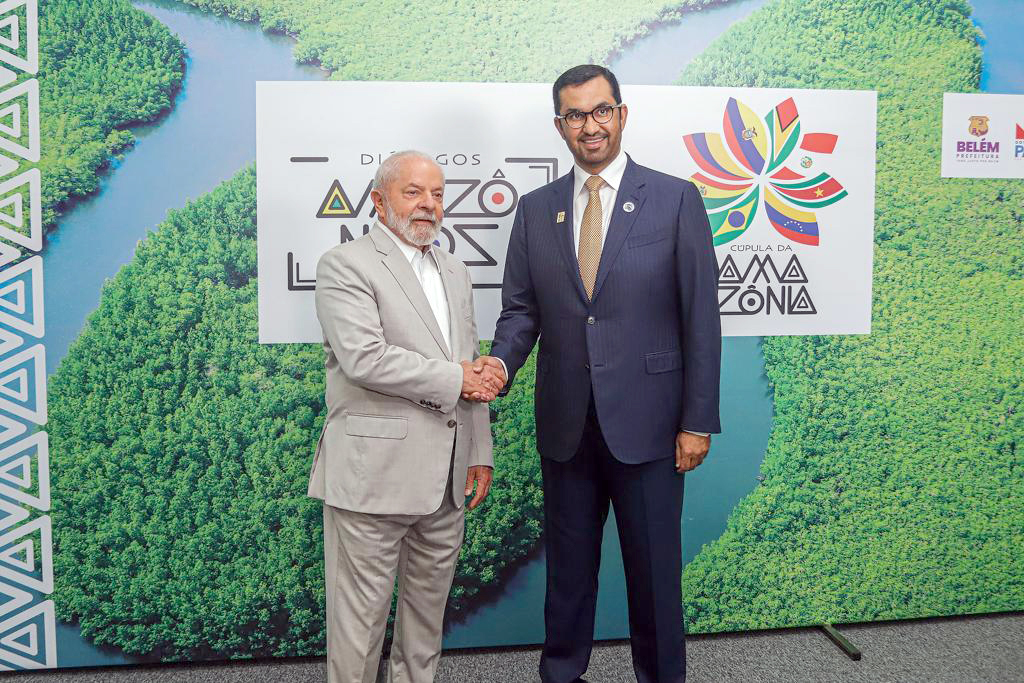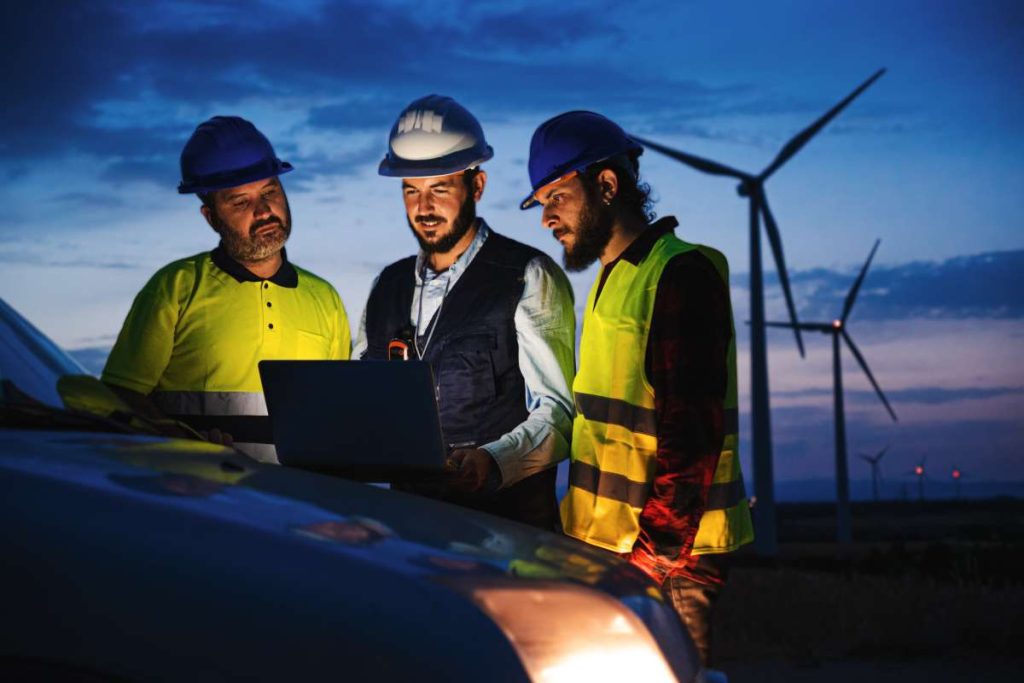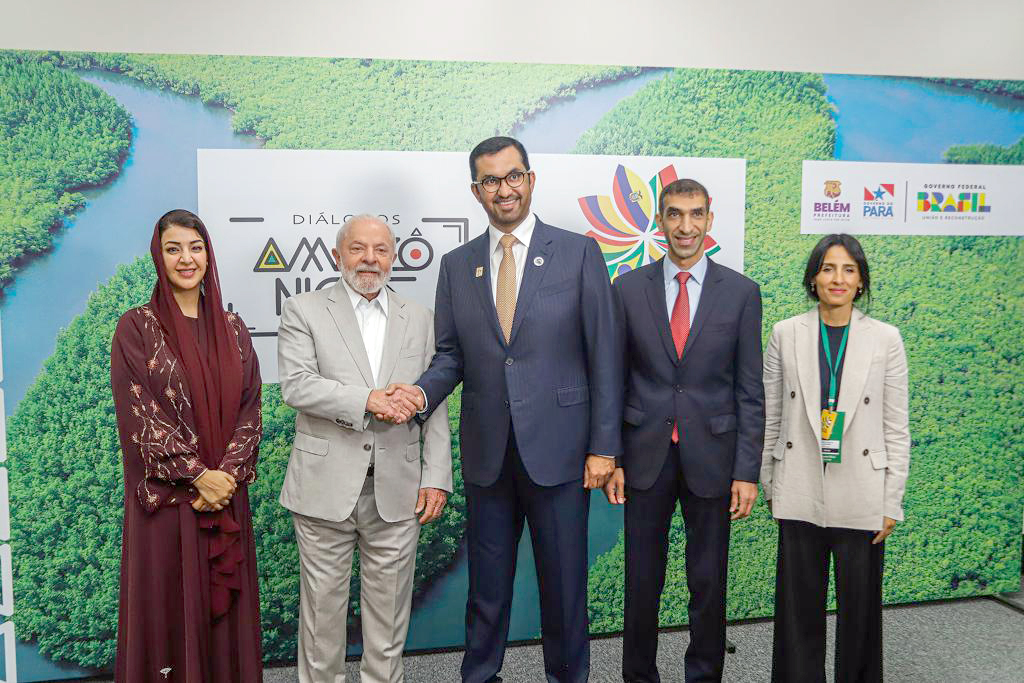Dr. Sultan bin Ahmed Al Jaber, Minister of Industry and Advanced Technology and COP28 President-Designate, praised President Lula for championing bold policies that prioritise Indigenous Peoples and serve as a blueprint for other regions…reports Asian Lite News
A high level delegation from the UAE meets top leaders from the Amazon region during the Amazon Cooperation Treaty Organisation (ACTO) at South Brazilian city of Balem.
Dr. Sultan bin Ahmed Al Jaber, Minister of Industry and Advanced Technology and COP28 President-Designate, gave remarks at the Amazon Summit and Collaboration for Sustainable Development, urging leaders to build on President Lula da Silva’s commitment and inspire transformational progress on nature at COP28.
Gathering in the Brazilian city of Belém, Dr. Al Jaber met with leaders from the region and around the world to discuss ways to advance sustainable development and forest protections. All member states of the Amazon Cooperation Treaty Organisation (ACTO) attended the summit.
Among the issues being discussed at ACTO’s first such meeting in 14 years were a possible deal to halt deforestation by 2030 and joint efforts to fight rampant illegal mining and organised crime groups that are tightening their grip on the rainforest region. The Brazilian President unveiled a blueprint for the future of the Amazon, a 6.7m sq km region that is home to nearly 50 million people spread across eight countries and one territory.
During his visit to Brazil, Dr. Al Jaber held meetings with world leaders to discuss the COP28 energy transition agenda, including with Luis Arce, President of Bolivia; Gustavo Petro, President of Colombia; Felix Tshisekedi, President of the Democratic Republic of the Congo; and Mark Phillips, Prime Minister of Guyana.
Dr. Al Jaber also held bilateral meetings with Marina Silva, Minister of Environment of Brazil; Mauro Vieira, Minister of Foreign Affairs of Brazil; Jean Paul Prates, CEO of Petrobras; and Antonio Queiroz, Vice President of Innovation, Technology and Sustainable Development at Braskem, among others.

Dr. Al Jaber said, “You are the guardians of a vital and delicate ecosystem that sustains life, lives and livelihoods, not only for the peoples of the Amazon region, but for the planet we all share.”
In his speech, Dr. Al Jaber praised President Lula for championing bold policies that prioritise Indigenous Peoples and serve as a blueprint for other regions. He also marked the opportunity to engage with leaders in Brazil, the host of COP30, to build a substantive bridge between COP28 and COP30 that ensures inclusive, resilient and lasting climate progress.
“We will build on the experience and the lessons that the Amazon Cooperation Treaty Organisation and Indigenous Peoples can teach us in advancing the dual goal of protecting and restoring nature, while advancing sustainable development.”

The day prior, Dr. Al Jaber met with the Minister of Indigenous Peoples of Brazil, Sonia Guajajara, and representatives of Indigenous leaders from the Amazon.
Dr. Al Jaber added, “Critically, we will put the rights of Indigenous peoples front and centre of our approach to nature. While representing five per cent of the global population, indigenous communities protect over 80 per cent of our biodiversity.”
He also held a bilateral meeting with President Lula, underscoring the important role that G20 nations play in driving climate action.
“Let me commend the leadership of President Lula in reducing deforestation in Brazil by 34 percent in just the last six months and targeting zero illegal deforestation by 2030. This is the kind of leadership we want to build on to inspire transformational progress at COP28 on nature, alongside all climate pillars. We will work to enhance South-South cooperation to strengthen the alliance between the leaders of tropical forest regions from the Amazon to Indonesia and the Democratic Republic of Congo and look to expand it further,” he said.
Dr. Al Jaber underscored that delivering transformational progress will require a shift in climate finance. “We need to expand available, accessible and affordable finance to meet the needs of the most vulnerable and ensure that adequate finance meets the needs of nature.”
He confirmed plans to keep the pressure on donor countries to fulfill the overdue pledge of US$100 billion and ensure a designated portion of the funds is directed to nature and forest protection. Significant reform of international finance institutions and multilateral development banks was also cited as critical to unlocking more concessional finance, lowering risk and bringing private finance to the table.
“In addition, we are calling on all parties to match the Kunming-Montreal Biodiversity Framework they signed up to last year that protects 30 percent of nature by 2030, with budgeted strategies,” Dr. Al Jaber said, adding that “This includes directing finance to restore degraded agricultural land, support sustainable farming, protect coastal areas, marine life, marshlands, rivers and freshwater lakes.”
Dr. Al Jaber also acknowledged that sustainable agricultural development must aim to provide food security while safeguarding nature, an area in which Brazil has excelled. “Ensuring the health of our natural environment is a critical element for the necessary transformation of the world’s food and agricultural systems. Brazil, as one of the largest producers and suppliers of food to the world, is already taking progressive steps on this journey that we will seek to build on.”
As part of the COP28 Presidency delegation to Brazil, Razan Al Mubarak, UN Climate Change High-Level Champion for COP28, emphasised the inextricable link between addressing climate change and nature loss.
“We have just over six years to simultaneously reverse biodiversity loss, halve emissions, enhance adaptation, and advance equity. This transformation needs to be inclusive, nature positive and with justice at its heart,” said Ms. Al Mubarak. “It is my strong conviction that investing in nature is the most cost-effective mitigation and adaptation solution for climate change.”
She also stressed the critical inclusion and support for Indigenous Peoples and Local Communities (IPLCs) in the development of collective climate and nature solutions, adding: “We must all recognise the fundamental role of IPLCs in protecting the world’s most biodiverse and ecologically important areas. Over 75 percent of forests are protected by indigenous peoples and local communities, yet only 17 percent of funds allocated in the last ten years included an Indigenous Peoples and Local Communities organisation. Indigenous Peoples need access to resources to maintain their self-determined climate actions.”

Leave a Reply